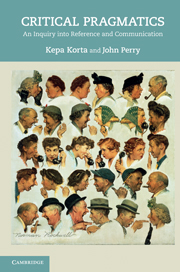Book contents
- Frontmatter
- Contents
- Preface
- Acknowledgments
- 1 Introduction
- 2 A short history of reference
- 3 Acts, roles, and singular reference
- 4 Elements of reference
- 5 Demonstratives
- 6 Context sensitivity and indexicals
- 7 Names
- 8 Definite descriptions
- 9 Implicit reference and unarticulated constituents
- 10 Locutionary content and speech acts
- 11 Reference and implicature
- 12 Semantics, pragmatics, and Critical Pragmatics
- 13 Harnessing information
- 14 Examples
- Bibliography
- Index
6 - Context sensitivity and indexicals
Published online by Cambridge University Press: 05 March 2013
- Frontmatter
- Contents
- Preface
- Acknowledgments
- 1 Introduction
- 2 A short history of reference
- 3 Acts, roles, and singular reference
- 4 Elements of reference
- 5 Demonstratives
- 6 Context sensitivity and indexicals
- 7 Names
- 8 Definite descriptions
- 9 Implicit reference and unarticulated constituents
- 10 Locutionary content and speech acts
- 11 Reference and implicature
- 12 Semantics, pragmatics, and Critical Pragmatics
- 13 Harnessing information
- 14 Examples
- Bibliography
- Index
Summary
Role-contexts
The word ‘context’ is often, perhaps most often, used to mean the linguistic context, that is, ‘the parts of a written or spoken statement that precede or follow a specific word or passage, usually influencing its meaning or effect.’ This is what is meant when we say someone has ‘taken a remark out of context.’ It is what we mean when we say that speech-recognition systems look at the contexts of the words they are identifying. It is not too far from the original idea behind a ‘context-free grammar,’ i.e., one in which phrases can be taken out of context; the syntactically important properties don't depend on what goes on in other phrases.
In the philosophy of language, however, a more general meaning is common: the set of circumstances or facts that surround a particular event, situation, etc. From the point of view of a theory of utterances, things quickly get a bit complex thought of in this way. As we have said, we are thinking of utterances as intentional acts of speakers at times, involving beliefs, intentions, and other mental states causing bodily movements of a sort appropriate to make sounds, write letters, type, and the like. Where do such events occur? What counts as inside them, and what counts as being in their surroundings?
We think of context mainly as what we will officially call the ‘role-filling context.’
- Type
- Chapter
- Information
- Critical PragmaticsAn Inquiry into Reference and Communication, pp. 59 - 73Publisher: Cambridge University PressPrint publication year: 2011



